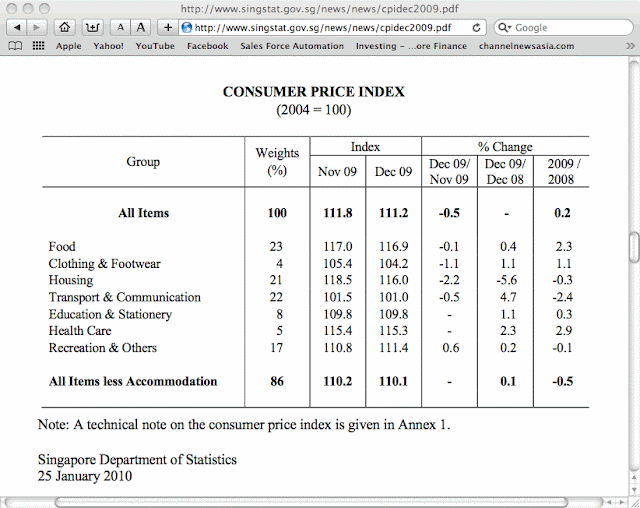Inflation, Inflation, Inflation
Hi all,
How's it going? Here are some latest updates on inflation.
Let's start with Singapore.
According to the Singapore Department of Statistics, inflation (as measured by the Consumer Price Index, or CPI in short) in 2009 was 0.6%. That's lower than what most expected, given that it was about 6.6% in 2008 (Reference: http://www.singstat.gov.sg/stats/themes/economy/hist/cpi.html)
With the latest data, the following average inflation rates for the various periods can be calculated. I've done some work for you and here are the results:
How's it going? Here are some latest updates on inflation.
Let's start with Singapore.
According to the Singapore Department of Statistics, inflation (as measured by the Consumer Price Index, or CPI in short) in 2009 was 0.6%. That's lower than what most expected, given that it was about 6.6% in 2008 (Reference: http://www.singstat.gov.sg/stats/themes/economy/hist/cpi.html)
With the latest data, the following average inflation rates for the various periods can be calculated. I've done some work for you and here are the results:
| Period | Average Annual Inflation (%) |
| 40 yr | 2.95 |
| 30 yr | 2.13 |
| 20 yr | 1.74 |
| 15 yr | 1.43 |
| 10 yr | 1.35 |
| 5 yr | 2.16 |
As you can see, Singapore's average inflation rates are pretty low, hovering around 2 - 3%. The last 5 years had been relatively higher, at 2.16%
A look at the longer term trend (the 40-year period) shows that inflation is close to 3%. In another words, things generally have been getting more expensive at 2.95% per year!
Simple mathematics: 2.95% minus 0.1% equals 2.85% LOSS every year!
That's why it's important to invest, not simply to grow your money, but more importantly to prevent it from shrinking!
Ever Higher Inflation?
That's just one part of the story. The actual inflation may possibly be higher than what's shown by the CPI.
Firstly, understand that CPI measures the change in the prices of a fixed basket of goods and services commonly purchased by the majority of households. (Reference: http://www.singstat.gov.sg/news/news/cpidec2009.pdf)
A look at the longer term trend (the 40-year period) shows that inflation is close to 3%. In another words, things generally have been getting more expensive at 2.95% per year!
If you're having most, or all, of your savings in your bank account, which gives interest starting at a miserable 0.1% per annum, you are losing the value of your hard earned money.
Simple mathematics: 2.95% minus 0.1% equals 2.85% LOSS every year!
That's why it's important to invest, not simply to grow your money, but more importantly to prevent it from shrinking!
Ever Higher Inflation?
That's just one part of the story. The actual inflation may possibly be higher than what's shown by the CPI.
Firstly, understand that CPI measures the change in the prices of a fixed basket of goods and services commonly purchased by the majority of households. (Reference: http://www.singstat.gov.sg/news/news/cpidec2009.pdf)
Now, this fixed basket of goods and services may not be exactly the same goods and services that you buy. Or the goods and services that you buy may not be in this basket.
To understand this important concept better, take a look at the following article from MarketWatch:

Irwin Kellner tells of the reasons why the CPI in the US may not be the best, or even accurate, indicator of inflation.
Do you think the same is happening with your local "official" CPI? And how does it affect your investment, savings and worth of your money? I'll leave that thinking to you :)

Comments
Post a Comment